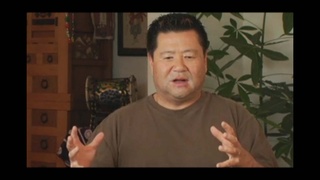Interviews
Taiko Community
I got to know other musicians up in the Bay Area—Russel Baba and other people who were involved with Tanaka Sensei. And as a result, I ended up getting to know Tanaka Sensei, too. Actually, when he came to LA for a little gig, he would call me up, and I would go play fue with him. There was a closeness in that community, especially early when there weren’t that many players around. Yeah. Very close connection between the communities in Los Angeles—New York actually—and Los Angeles and San Francisco that I always had a place to stay somewhere in San Francisco. Or if I went to New York, somebody would open up their apartment or home on very short notice as a kind of sharing.
Date: December 10, 2004
Location: California, US
Interviewer: Art Hansen, Sojin Kim
Contributed by: Watase Media Arts Center, Japanese American National Museum
Explore More Videos

The importance of Japanese American role models in childhood community
(b. 1955) Lawyer

Recognizing issues of dual identity in the nisei generation
(b. 1955) Lawyer

Heightened awareness of identity as a Japanese American
(b. 1955) Lawyer

Growing up with some Japanese families (Spanish)
(b. 1950) Nisei Chilean, Businessman

The various realities of Nikkei in Latin America (Spanish)
(b. 1950) Nisei Chilean, Businessman

Decision between becoming a minister or musician
(b. 1949) Musician and arts educator and adminstrator.

Starting Japanese American taiko their own way
(b. 1949) Musician and arts educator and adminstrator.

Japanese American taiko is not Japanese taiko
(b. 1949) Musician and arts educator and adminstrator.


Parents didn't accept me playing taiko in the beginning
(b. 1949) Musician and arts educator and adminstrator.

Performing the koto and taiko drum together, in Japan
(b. 1949) Musician and arts educator and adminstrator.

Taiko considered "Jazz" in the Philippines
(b. 1949) Musician and arts educator and adminstrator.

Tango makes him to stay in Argentina (Spanish)
(1925-2014) La Plata Hochi, Journalist

Relief fund to support Japanese communities (Japanese)
(1900–1996) The mother of Nikkei Brazilian immigration

Role of Assistancia Social dom Jose Gaspar (Japanese)
(1900–1996) The mother of Nikkei Brazilian immigration
